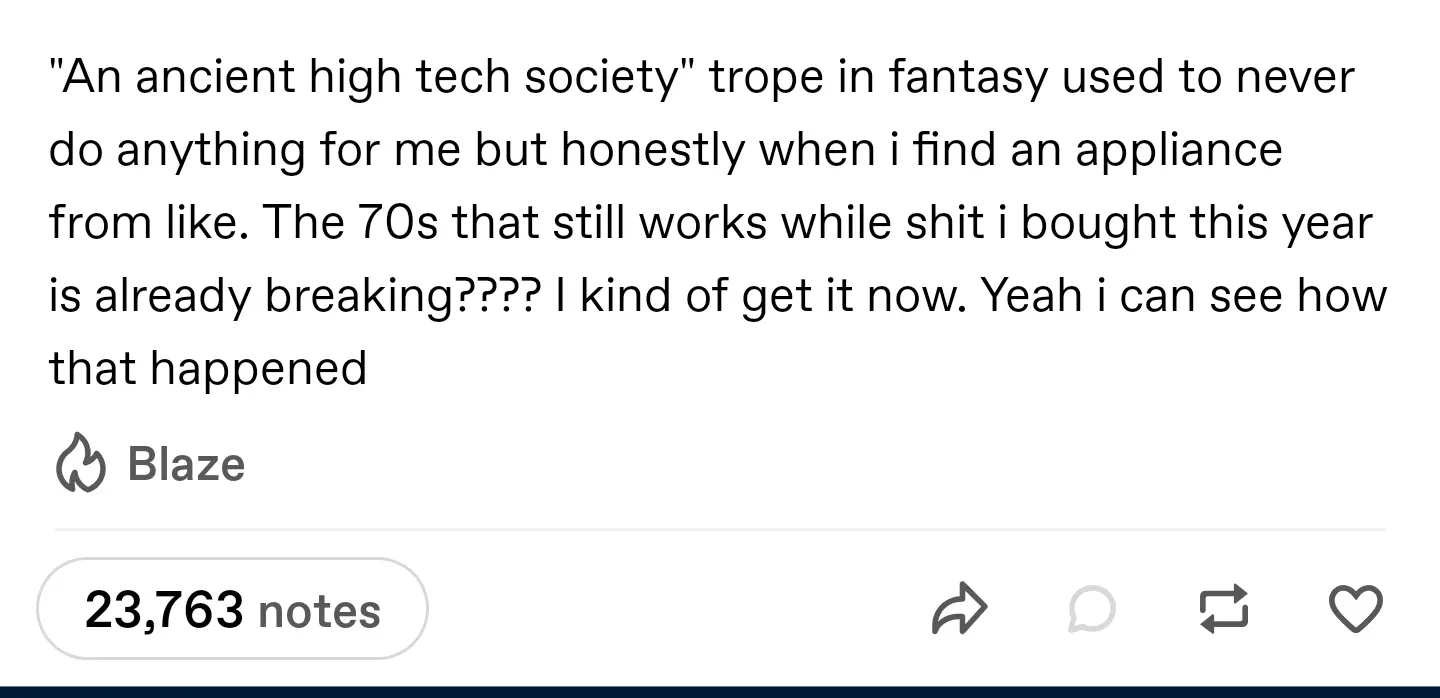this post was submitted on 23 Dec 2023
632 points (97.2% liked)
solarpunk memes
2813 readers
48 users here now
For when you need a laugh!
The definition of a "meme" here is intentionally pretty loose. Images, screenshots, and the like are welcome!
But, keep it lighthearted and/or within our server's ideals.
Posts and comments that are hateful, trolling, inciting, and/or overly negative will be removed at the moderators' discretion.
Please follow all slrpnk.net rules and community guidelines
Have fun!
founded 2 years ago
MODERATORS
you are viewing a single comment's thread
view the rest of the comments
view the rest of the comments

There's a confirmation bias aspect to this. There were a lot of things made in the 70s that did not keep working for fifty years. You don't think of them because they're already broken down for parts, recycled or buried in a landfill. There are some things that have kept working only because someone put regular care and maintenance into them.
There are a lot things made today that won't make it fifty years from now. There are some things that will.
If disposable culture concerns you, learn how to repair things (clothes, kitchen appliances, furniture, electronics, etc) and buy things that can be repaired (like the Framework laptop).
But that's something that I witnessed change since the 80's and makes the electronic crappier, it's the fact that appliances in the 70's-90's were incredibly easy to fix. It was not rare for the manufacturer to even give schematics in the user's manual. There were shops to repair stuff everywhere and it was something approachable by anyone who could hold a soldering iron.
They also had a far higher price. This changed the effective disposability. E.g. you likely wouldn't pay $500 to fix a $400 washing machine. If it were a $10,000 washing machine, it's more reasonable.
This is why TV repair shops disappeared. TVs got cheap enough that the labour cost would outweigh the replacement cost. I recently fixed a TV with a dodgy backlight. The parts cost £12, but it took me a few hours. If my time was factored in, in a business manner (including accounting for downtime, profit ,and expenses) it would have been over 75% of the replacement cost.
Also, a lot of newer features add complexity and make for more difficult repairs.
Eh, not really. If anything it's easier because all you have to do is swap out circuit boards instead of soldering in new parts.
This. I had a winterized display (leaky roof inspired water damage) and replaced a board and fixed it. Took about 20 min including the time to disassemble the tv itself. $20.
The research to figure out what components caused the problem was significant, however. Because tv repair isn’t a thing anymore even tho it absolutely should be.
FWIW I think this is technically survivorship bias, not confirmation bias (but maybe the latter is a form of the former?)
I do agree, there is probably a lot of shit from the 70s that stopped working early on. On the other hand, I do feel like planned obsolescence is a thing. Look at Instant Pot. They're going bankrupt because everyone already owns an Instant Pot and they all still work.
https://www.theatlantic.com/technology/archive/2023/06/instant-pot-bankrupt-private-equity/674414/
The problem in my eyes the failure is in the private equity firm that bought them trying to draw blood from a stone, not the Instant Pot.
Yes, they came out with a 1000 SKU's and over extended themselves to flood the market with the instapot brand. I saw an instapot coffee maker.
Most appliances are not easy to fix because its just a circuit board connected to a machinary, unlike appliances of the past which had mechanical components.
Now, knobs and buttons are replaced by a touchscreen and good luck fixing that on your own.
I remember when one of our local publications asked their readers "what kind of old appliances you still have around at home that you use regularly?" and the article was flooded with photos of 1970s kitchen appliances. Well duh, of course those still work, if you take them out of the cupboard once a year to bake a cake or whatever.